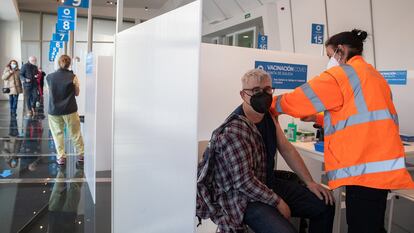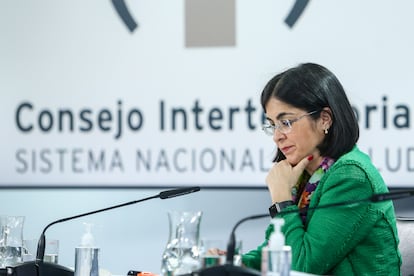Spain raises age limit for Oxford-AstraZeneca vaccine to 65
Experts admit it will be hard to restore trust in the Covid-19 shots, the use of which is set to restart on Wednesday. A recent survey shows 56% of Spanish respondents now consider it ‘unsafe’


Spain will resume use of the Oxford-AstraZeneca Covid-19 vaccine on Wednesday, and is also raising the age limit for recipients from 55 to 65.
After temporarily suspending the treatment due to a handful of cases of blood clots in several European countries, the Spanish Health Ministry has restarted the rollout based on a report by the European Medicines Agency (EMA), which said that even though a connection between the vaccine and rare cases of clotting cannot be entirely ruled out, “the benefits of the vaccine in combating the still-widespread threat of Covid-19 continue to outweigh the risk of side effects.”
At a meeting of Spain’s Inter-Territorial Council of the National Health System on Monday, central and regional health officials also decided to extend the use of the AstraZeneca vaccine to a larger target group of adults, with the upper threshold now established at 65 years of age instead of 55.
From now on, the AstraZeneca vaccine will be administered to essential workers as before (mostly teachers, law-enforcement officers and healthcare workers who are not on the front lines, such as physiotherapists, health inspectors, private practitioners, veterinarians and pharmacy employees) but it will also target the general population between the ages of 55 and 65. Until now, this latter group was slated to receive either the Moderna or the Pfizer-BioNTech vaccine.
Restoring trust

Experts admit that the mixed messages sent out by national governments are undermining citizen trust in the AstraZeneca vaccine. A survey of 1,050 Spaniards conducted by the data analysis firm YouGov on March 17 and 18 shows that 56% of respondents viewed the vaccine as “unsafe.” By comparison, this figure was 25% in February.
“It is reasonable for people who have had their first shot [of the AstraZeneca vaccine] to now be bewildered. But we have to generate trust and credibility,” said Amós García, president of the Spanish Vaccinology Association and a member of the expert committee advising the Spanish government.
“It’s going to take a major education drive to restore people’s trust. It will be hard to get people who received the first dose to come in for the second one,” said Magda Campins, head of preventive medicine at Vall d’Hebron Hospital in Barcelona.
Health Minister Carolina Darias has warned that right now there is no “plan B” for a person who rejects the AstraZeneca vaccine – meaning that choosing a different shot is not an option.
No age limits
At the Council meeting, representatives for Madrid and Catalonia supported eliminating all age limits for the AstraZeneca vaccine, but the Health Ministry first wants to analyze a large clinical trial in the US whose results were announced on Monday. According to this study, which involved nearly 32,500 participants, the vaccine was 79% effective overall in preventing symptomatic infections and 100% effective in preventing severe forms of the disease. In the 65-and-over age group, which accounted for 20% of all participants, the vaccine was 80% effective.
Health Minister Darias said that extending the age limit even further is “an option that’s on the table.” Several European countries have already eliminated the age limit for the AstraZeneca vaccine, including Italy, Greece, Germany, Belgium, the Netherlands, Sweden and Portugal. France, on the other hand, is reserving it for those 55 and over.
Despite a slow rollout, the Spanish authorities are still hoping to vaccinate 70% of the adult population by the end of the summer even as experts are warning about an impending fourth wave of the pandemic.
Experts consulted by this newspaper said there is no question about the benefits of the AstraZeneca vaccine. “When the 55 age limit was set, it was the right thing to do because there was no statistically solid scientific evidence at the time supporting its administration to older adults. But there is more evidence now,” said García. He defends the new limit of 65 until there are more studies on the vaccine’s effects on older people.
But Daniel López-Acuña, a former director of emergencies at the World Health Organization (WHO), thinks there should be no age limit at all: “I support extending it to all ages. This would allow us to go faster and immunize the more vulnerable individuals,” he said.
English version by Susana Urra.
Tu suscripción se está usando en otro dispositivo
¿Quieres añadir otro usuario a tu suscripción?
Si continúas leyendo en este dispositivo, no se podrá leer en el otro.
FlechaTu suscripción se está usando en otro dispositivo y solo puedes acceder a EL PAÍS desde un dispositivo a la vez.
Si quieres compartir tu cuenta, cambia tu suscripción a la modalidad Premium, así podrás añadir otro usuario. Cada uno accederá con su propia cuenta de email, lo que os permitirá personalizar vuestra experiencia en EL PAÍS.
¿Tienes una suscripción de empresa? Accede aquí para contratar más cuentas.
En el caso de no saber quién está usando tu cuenta, te recomendamos cambiar tu contraseña aquí.
Si decides continuar compartiendo tu cuenta, este mensaje se mostrará en tu dispositivo y en el de la otra persona que está usando tu cuenta de forma indefinida, afectando a tu experiencia de lectura. Puedes consultar aquí los términos y condiciones de la suscripción digital.








































